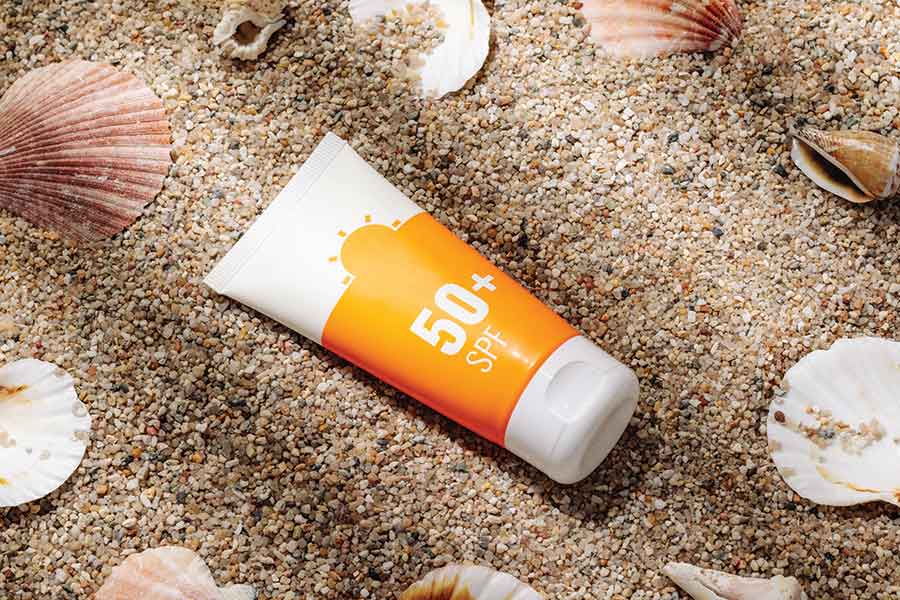SPF, PA+++, mineral, organic… what do all these sunscreen buzzwords mean?
Whether it is the conventional Indian concerned with getting tanned in the heat, or the fear of wrinkles and skin cancer due to lengthened sun exposure, the summer is a month of skin concerns and stress around the world. But we know that a sunscreen is all it takes to rid ourselves of worrying about the state of our skin because of the heat.
Yet, the vast sunscreen aisles at your local beauty retailer or even online are confusing. Between medical jargon, mixed reviews, a growing list of guidelines and multiple measures of sunscreen effectiveness, any average person would be lost.
So what is sunscreen, how does it work, and how should you choose which sunscreen you should use?
The Sun, UV-A, and UV-B
How does the sun really affect our skin? It is mainly UV rays which are the harmful components of sunrays – namely UV-A and UV-B. UV-B rays have mainly superficial impact, hitting the outer dermis layer of the skin and hence causing tanning. UV-A rays, on the other hand, penetrate deep into the skin, causing issues such as early aging, wrinkles, and in extreme cases, skin cancers.
Sunscreen, then, works to either block or scatter both the UV-A and UV-B rays which reach the skin.

SPF and UV-B
SPF is the most common way used to measure the effectiveness of sunscreen. However, SPF or Sun Protection Factor is only a partial measure – it is simply a measure of the amount of time taken for the skin to burn. Hence, SPF is only a measure how effectively UV-B rays are blocked.
Since the rate each person’s skin burns is different, SPF is simply a comparison of how long skin takes to burn if they use the sunscreen, vs. if they had not. So, a sunscreen with a SPF 20 rating means that you would take 20 times longer to burn if you were wearing the sunscreen compared against if you were not.

While a high SPF number may seem fancy, you don’t need always to spring for an ultra-high SPF sunscreen. Research shows that a SPF 30 sunscreen blocks around 97% of harmful UV-B rays, and should be more than enough for everyday use.
PA+++ and UV-A
The PA+++ measure is the latest label to hit the market, and is used on several sunscreen marketing packages. But what does this mean?
If SPF is the measure of the sunscreen’s effectiveness against UV-B, then PA+++ is the measure of the sunscreen’s effectiveness against UV-A. The PA rating system was adapted from the Japanese PPD testing system, and essentially measures how many more times you are protected against UV-B rays. PA+ means that you are at least two times more protected against UV rays; PA++ means that you are at least 4 times more protected; so on and so forth, with PA++++ being the highest level of protection.

Mineral and chemical formulas
What about mineral and chemical sunscreens? Which one should you choose?
Mineral and chemical sunscreens mainly differ in the active ingredients in them. While they can both be effective, there are a few essential differences between them. Mineral sunscreens can be responsible for the white cast effect left on skin, though newer sunscreens may not have this drawback. Chemical sunscreens need to sit on the skin for about 20 minutes before they can be effective. They can also cause allergic reactions on users with more sensitive skin. These are just some of the factors you should consider when picking a sunscreen for yourself or for a client.
Makeup and Sunscreen
“My foundation contains SPF! Should I still use sunscreen then?”
This is a common question asked by makeup and skincare users. It is true that makeup products containing SPF have become more common these days. However, you would likely only use a pump or two of foundation, while you would need a lot more sunscreen to get the full SPF protection. Most dermatologists recommend using at least two fingers’ worth of sunscreen and reapplying at regular intervals for its full protective effect. Hence, while makeup containing sunscreen could be a good addition to your skincare routine, you should still use a sunscreen underneath your regular makeup routine to properly protect you from the sun.

Let your sunscreen knowledge be your greatest asset this summer holiday. Falling for exaggerated claims and unknown language might have befuddled you in choosing a sunscreen, but not anymore. Armed with the sunscreen knowledge you now have, your skin can be just as healthy and well-rested as you are this holiday season.







